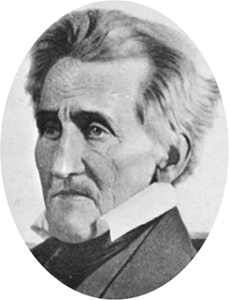
GENERAL, PRESIDENT, DISTILLER
1767–1845
![]()
The Hermitage, Davidson County, Tennessee
Very little has been written about Jackson as a distiller, but it is known that a still operated at the Hermitage, his home in Nashville, and before that at his Hunter’s Hill Farm. His familiarity with whiskey, both as a maker and a consumer, surely bolstered his image as a leader of the common man.
Jackson grew up in North Carolina, and during the Revolutionary War served as a courier, for which he was captured and starved. His brothers died in the war; his mother died while nursing sick American prisoners on a ship in Charleston—all the makings of a grudge that would give Jackson great satisfaction in avenging, famously, at the Battle of New Orleans. Jackson studied law in North Carolina and then moved to the territory that would become Tennessee, where his scrappy character was well suited to succeed as a lawyer and then a judge, while managing a plantation and his distillery.
In 1799, Jackson obtained a license to work two stills, one 127-gallon and one 70-gallon pot. In 1800, the distillery burned: “All his cooper ware and his Stills rendered entirely unfit for use inasmuch as the caps and worms were almost entirely destroyed by the heat and the falling in of the roof and timber,” Thomas Hutchings wrote in a deposition as part of a petition for tax leniency after the fire. Also lost were three hundred gallons of whiskey. Jackson wrote several letters trying to clear up his tax obligation on the destroyed stills, though the tax would be repealed shortly after the incident by Thomas Jefferson’s administration. Jackson owned slaves, as many as forty-four at one point, though how many worked in the distillery is unknown. Receipts from Jackson’s rebuilt distillery in 1802 reference a business partner, Thomas Watson, and show corn, rye, firewood, four tight barrels, as well as a payment to William Irby for “setting the stills,” perhaps evidence that he was Jackson’s distiller.
As a young man in Tennessee, Jackson was known as a gambler, betting on billiards, cards, cockfights, and, of course, racehorses, including Truxton, a stallion fifteen hands, three inches high, bought for fifteen hundred dollars on a special trip to Virginia to find a breeding horse. He was known to drink, “occasionally hilarious over his whiskey and wine,” wrote James Parton, an early biographer.
In 1804, Jackson moved to the Hermitage, a Greek Revival plantation that would serve as the home he would make with Rachel Donelson, whose previous marriage would end up causing Jackson some grief in his successful campaign for president in 1828. Rachel had “lustrous black eyes, dark glossy hair, full red lips, brunette complexion, though of brilliant coloring, [and] a sweet oval face rippling with smiles and dimples,” wrote the daughter of a niece, which is to say that she must have been quite beautiful in her time. Jackson doted on her and had to be pulled away when she died suddenly just days before he was to begin his term as president. Her niece would serve as the First Lady, a role that has on occasion fell to non-spousal relatives.
Jackson no doubt served and consumed much whiskey while at the White House, where he presided over one of the ugliest presidencies in history. Even after his death in 1845, Jackson proved to be an irresistible marketing image for the whiskey industry: Both Old Hickory and Hermitage were popular brands over the next century.